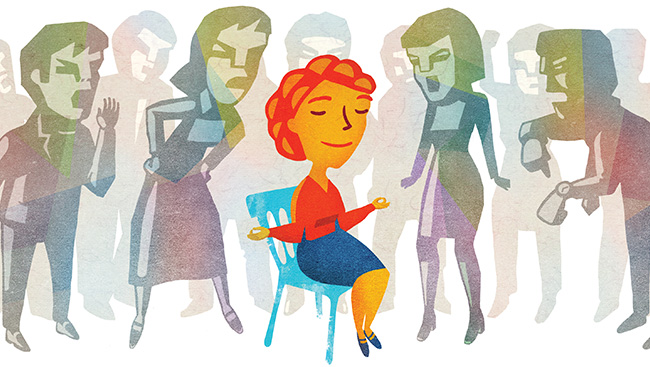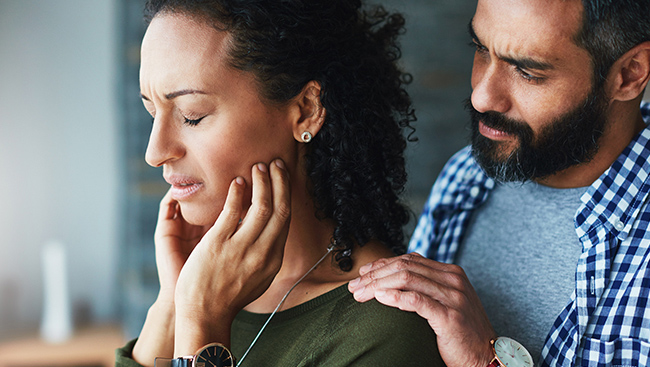10 tips to better cope with your anxiety
You know the dreadful feelings that come with being anxious: Your thoughts race and are focused on the worst possible outcome, your heart rate increases, maybe you feel short of breath and you’re so jittery you just can’t concentrate. Everyone experiences anxiety from time to time, and in fact it’s a normal part of life. For some people though, anxiety becomes a real problem and something they face every day.
The American Psychiatric Association (APA) found in a new study that Americans are more anxious today than they were a year ago, with 39 per cent of people reporting feeling more anxiety. The good news, however, is there are steps you can take to reduce that anxiety.The following 10 tips will help you alleviate your symptoms.

Establish a strong support network
If you’re suffering with an anxiety disorder, the world can sometimes seem to cave in on you. One way to remedy this feeling is to talk with others about what you are feeling. Bottled emotions do not resolve and can cause immense stress. Talk with your family and friends about obstacles you struggle to overcome. Many times we just need a sympathetic shoulder with whom to vent.
Consider exposure therapy
Often seen as a solution for fears and phobias, exposure therapy can be helpful for emotional and anxiety-provoking situations, too. Slowly expose yourself to your trigger. Start small and build up until you are no longer affected by the sight or concept itself. It sounds easier said than done, but starting small is the key to success. Don’t expect immense results out of the gate. Ease yourself into situations that you find uncomfortable. Baby steps are better for long-lasting success.
Find refuge in the paradise of solitude
Eliminate outside stress and turn to your own private world. This focus on the self can do wonders for anxiety and calm the waters. A critical point of growth is to check in with yourself and see how you are coping with your life and circumstances. When something causes you anxiety, that is your brain and body’s way of telling you something needs to change. Journaling and other forms of self-reflection are excellent methods to realign yourself into a healthy state.

Be patient but clear with those around you.
Not everyone experiences the stresses that you do with your disorder. It can be hard for others to relate to a state of being that is not commonplace for them. Educate people on your situation and how they can best help you. Respond to insensitive comments with empathy and thorough communication.
Educate yourself on possible medications that can help
Research which types of medications may best help you overcome your anxiety. A psychiatrist can be an asset in this quest for relief. Different antidepressants and benzodiazepines can help relieve some of the constant anxiety that plagues you. Try other therapies but keep your mind open to the possibility of aid with pharmaceuticals.
Seek the help of a psychologist.
Counselors and psychologists are there to help you sort out your problems. They can help remedy your reality into a bearable situation. The use of cognitive behavioral therapy can help train your thought process to better cope with anxious responses and tendencies. If one-on-one therapy is out of your capabilities or price range, seek group therapy or a support group to talk through your problems. The resources are there – you just have to look.
Try more advanced and effective treatments like Ketamine Therapy
If behavioral therapies and conventional medications do not help – thankfully, there is another option. Ketamine therapy is growing in popularity as a treatment for those with anxiety disorders. It is a medication given intravenously in a professional medical setting and the positive effects can be felt very quickly. Immediate relief of anxiety is reported from many patients.

Make pivotal lifestyle changes
Starting small and building as you establish new routines can help cement habits rather than have you living a trend. More sleep, healthier eating, and daily exercise are good places to start. These alleviate anxieties by setting a strong foundation from which to build a stress-free environment. Tackle one aspect at a time to not overwhelm yourself.
Simplify your life
Sometimes anxiety can blossom from too much chaos in your environment. Start by simplifying your immediate environment – these are places like your workspace and your home. Then you can turn it digital. A good clearing out works wonders for your emotional space as well. With the newfound space, you are then given room to breathe with a new state of mind.
Don’t hesitate to take some time off from your routines.
You may not realize how much your daily life antagonizes your anxiety. Take breaks and switch up usual routines in order to identify which faction may be amiss. A vacation is a good method to step back and reevaluate what triggers your symptoms.
The takeaway
Remember, you are not alone. Even well-known names like Ryan Reynolds, Emma Stone and Oprah Winfrey have spoken out about their struggles with anxiety, the same struggles that affect some 40 million people each year.
In our world of high demands where it seems we are constantly pressed for time and always connected through technology, it’s not surprising our anxiety levels are on the rise. Take time for yourself to remedy the stresses and reduce your anxiety.

ABOUT THE AUTHOR
Dr. Prakash Masand M.D. is a psychiatrist and the founder of the Centers of Psychiatric Excellence. Find more information at www.copepsychiatry.com




